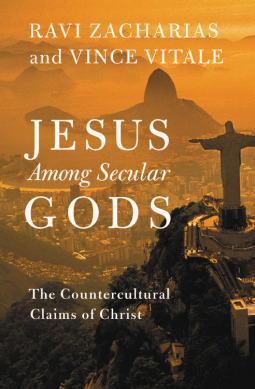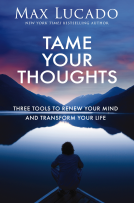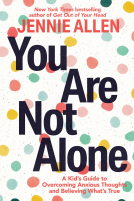
Jesus Among Secular Gods
The Countercultural Claims of Christ
by Ravi Zacharias; Vince Vitale
This title was previously available on NetGalley and is now archived.
Send NetGalley books directly to your Kindle or Kindle app
1
To read on a Kindle or Kindle app, please add kindle@netgalley.com as an approved email address to receive files in your Amazon account. Click here for step-by-step instructions.
2
Also find your Kindle email address within your Amazon account, and enter it here.
Pub Date Jan 03 2017 | Archive Date Apr 10 2017
FaithWords / Center Street | FaithWords
Description
The rise of these secular gods presents the most serious challenge to the absolute claims of Christ since the founding of Christianity itself. The Christian worldview has not only been devalued and dismissed by modern culture, but its believers are openly ridiculed as irrelevant. In Jesus Among Secular Gods, Ravi Zacharias and Vince Vitale challenge the popular "isms" of the day, skillfully pointing out the fallacies in their claims and presenting compelling evidence for revealed absolute truth as found in Jesus. This book is fresh, insightful, and important, and faces head on today's most urgent challenges to Christian faith. It will help seekers to explore the claims of Christ and will provide Christians with the knowledge to articulate why they believe that Jesus stands tall above all other gods.
Available Editions
| EDITION | Other Format |
| ISBN | 9781455569151 |
| PRICE | $24.00 (USD) |
| PAGES | 256 |
Average rating from 10 members
Featured Reviews
We are living in a day of competing truth claims that constantly clamor for our attention. Their influence on us as Christians usually occur outside of our awareness. Ravi Zacharias’ and Vince Vitale’s “Jesus Among Secular Gods,” helps us take the blinders off. Not only do they help us see and understanding the various “isms,” such as Atheism, Scientism, Pluralism, Humanism, and others, they give us intellectual and spiritual tools to release us from their sway and give us the ability to embrace a truly Christian Worldview. More importantly, they help us embrace, or rather be embraced by, the loving God in Jesus Christ. This is not only a must-read for those interested in apologetics but also for those who want to live as a faithful Christian in our complex and often-times confusing cultural context.
A book for academics or experienced Christian/theological scholars as it is not easy to read without genuine interest or background knowledge. Personally I enjoy the challenge but it will be a book I will come back to rather than read in one sitting.
 Educator 238757
Educator 238757
Ravi Zacharias is one name that I know I can trust. He is thoroughly Biblical and completely accessible in his writings and speech. He's so very intelligent, knows an incredible amount of information, and yet conveys it all in a gentle, logical, irreproachable way that leads the reader or listener into complete understanding of the issues at hand.
This book tackles many of the "-isms" or "secular gods" of today: atheism, scientism, pluralism, humanism, relativism, and hedonism. In each chapter, Zacharias and/or co-author Vince Vitale lay out the major tenants of the philosophy and the assumptions necessary to hold that belief. The authors then proceed to systematically address each of the tenants and assumptions, relying on Scripture to refute each. They don't just toss a Scripture into the mix. Rather, they present the Scripture and then discuss the logical implications of the Scripture against the tenants and assumptions. Along the way, the authors mix in personal stories and anecdotes illustrating the hollow consequences of the secular god as well as how Scripture and Jesus counter those situations and meet those needs.
I highly recommend this book to anyone wanting a clear picture of how this world thinks (regardless of actual stated "religion") and how Jesus addresses those thoughts. The writing and logical progression of thought is not overly complicated. A high schooler would be able to understand most of this book with some effort.
I gratefully received an eARC from the authors, publisher, and NetGalley in exchange for my unbiased review.
 Conrade Y, Reviewer
Conrade Y, Reviewer
What comes to mind when we think about idols? In the Old Testament, it was about graven images or some physical artifact. In the New Testament, we read about false teachings and deceptive ideologies. One common theme among these idols and false teachings is the way it tries to unravel God's intended purposes, to suggest other ways instead of God's way. This trend continues today under the guise of secular gods. Modern society in the West has become more secular than ever. The altars are everywhere and comprise both religious as well as non-religious idols. The claims of Christ are not only opposed by the traditional mainstream religions and cults, they are also aggressively pushed back by the secular forces of today. Famous apologist Ravi Zacharias knows it full well, having received a hostile reception on the basis of his stand for Jesus. He shares: "I was a nominal Christian but never gave that much thought, either. Most of my friends were either Hindu or Muslim or Sikh, with a few others of different faiths. I never recall feeling any anger or hostility toward those who believed differently than me, no matter how ludicrous their beliefs may have seemed to me. Nor do I remember ever being on the receiving end of such anger and hostility because I did not have the same belief."
Perhaps, many of the protestors who often carry accusing placards of "intolerance, prejudice, disrespect, hatred, and offense"at Christianity are subconscious practitioners of the same. It is only the object of the protest that is different. It possesses the same blind spots that humans have been carrying throughout history. Like previous eras, this is a battle of worldviews. The mask is different but the fundamental face of idolatry is the same. It rebels against everything God stands for. In the process, it exposes its very own weakness: rootlessness. The trouble is this. It pulls down the world, the culture, and all who rebels against God down the quicksand of the masks of modern secularism. Authors Zacharias and Vitale highlight six such masks.
The first is the mask of Atheism which has appeared in the forefront of rebellion through the radical atheists like Richard Dawkins and Sam Harris. Atheism simply asserts that there is no God. Zacharias points out the universal need for the new paradigm for life and destiny: "Eternity; morality; accountability; charity." Atheism fails to give a sufficient answer for what happens after death; the poverty of amorality; the lack of accountability; and the meaning of charity.
The second mask is scientism which is a worldview of using science to disprove God. Science is more limited than we think. It is not necessarily incompatible with faith in God. However, it fails to explain sufficiently the beginning, the knowledge, and the future of the Universe. Even the premise "science can explain everything" needs to be unpacked and explained adequately.
The third mask is pluralism which essentially is an assertion of all paths being equal and valid. Unfortunately, they fail to explain the origin, meaning, morality, and destiny of life. Amid the good intentions (Value, Opportunity, Unity) are three bad assumptions. 1) Equal claims; 2) Equal Rational; 3) Equal Impact. Vitale suspects that part of the problem lies in people unwilling to choose. By declaring every path equally valid and equally good, it justifies this position of not choosing a path and to let sleeping dogs lie. The fact is this: Not making a choice is already a choice.
The fourth mask is humanism which is a total dependence on the self. Zacharias guides us through the historical development of the roots of humanism, calling the Renaissance the "womb of modern secularism." It moved from the arts to philosophy, to modern science and spirituality. There are at least eight different kinds of humanism (evolutionary; behavioural; existential; pragmatic; marxist; egocentric; cultural; and even Christian humanism). The main problem is the grounding on relativism which justifies the need to give everybody their right to their own opinion, regardless of truth. That reminds me of the book of Judges where generations of people are happy to let everyone do as they please. The results are not pleasant.
The fifth mask is Relativism, something that Zacharias makes a particularly passionate argument against. In order to make sense of truth, one needs to understand the significance of absolute. For Zacharias, Christianity is basically about the four absolutes of Creation, Incarnation, Transformation, and Consummation.
The sixth mask is Hedonism which is the unquestioned assumption that everyone has a right to be happy. Vitale argues that the life of Jesus is a "powerful and sustained argument against hedonism." Why? It's because Jesus often landed himself in trouble by speaking out against the ills and evils of society. He stood against immoral lifestyles; against greed; and against things that look good on the outside but harmful on the inside. He shows us about Jesus's multiple responses against the path of hedonism.
This book is a powerful and sustained argument not only against the secular gods of today but more importantly, for the truth that is timeless and eternal. In Jesus, we see this in person. In Jesus, we see true fulfilment of God's love and promise for the world. The battlefield for truth is a huge one that all believers are to gear up for. There are only two positions. Either we are for truth or we are against. There is no sitting on the fence. If you have been listening to Ravi Zacharias's podcasts or his speeches on YouTube, you will find a lot of his stories and arguments familiar. It may seem to be repeated phrases and arguments that center around the same point. In our culture of infatuation with all things latest and newest, we might be easily bored because of this. Truth be told, this is a necessary truth. It reminds me of the gospel. It needs to be repeated through the ages over and over again. It is not because the message is the boring same old story. It's because many hearts in this world have become dull and unwilling to change. Like the story of the old Rabbi who taught his students everyday to keep the TORAH on their hearts. When asked why "on" instead of "in," the rabbi wisely replied that when the heart breaks, the words will fall in. We are all creatures of habit. We often have hardened hearts. Only when we become humble or humbled, will we be open to the truth that will fall into our hearts. If we let it.
Clearly written and powerfully argued, this book is definitely an important voice to be repeated through the ages. For down the road, there will be changing manifestations of alternative worldviews. When that happens, the gospel of Christ will be there. May we all love to tell the old, old story of the gospel that is free and truly frees.
Rating: 4.75 stars of 5.
conrade
This book has been provided courtesy of Faithwords and NetGalley without requiring a positive review. All opinions offered above are mine unless otherwise stated or implied.
Readers who liked this book also liked:
Harold Earls, IV; Rachel Earls
Biographies & Memoirs, Parenting, Families, Relationships















